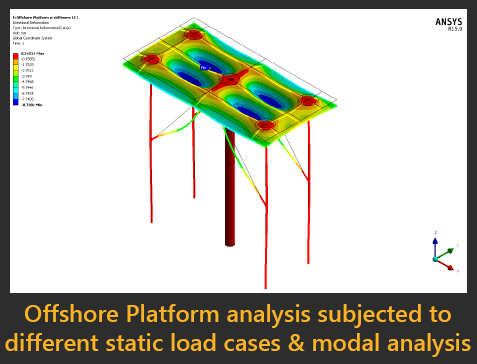- Program overview

Title: Introduction to FEM analysis with ANSYS Mechanical – online course. Director: Professor Juan José Benito Muñoz.
Department: Construction & Manufacturing Engineering (UNED University).
Software: ANSYS MECHANICAL Workbench (free license is included).
- Eligibility & requirements
A degree is required, although university students in their last year of their course may be admitted with proof of their academic status.
- Presentation and objectives
The objective of this course is to introduce attendees to the use of Finite Element analysis software, allowing them to acquire the basic skills to enable them to work with this type of analysis in their professional practice.
This course originated as a collaboration project between UNED and Ingeciber, S.A., a company specializing in Computer-Aided Engineering (CAE).
- Content
The course consists of three subjects:
- ANSYS Mechanical Workbench Lectures (pdf).
- ANSYS Self-paced Videos.
- Practical Application Exercises with ANSYS Mechanical.
The content of ANSYS MECHANICAL subjects is detailed below.
Attendees will study SpaceClaim, which is the ANSYS Geometrical Pre-processor. With SpaceClaim attendees will be able to create simple and complex geometries as well as modify geometries from standard CAD software.
The study of ANSYS MECHANICAL has been structured into the following chapters:
- Lecture 1: Introduction
- Lecture 2: Problem Statement
- Lecture 3: Modeling Approach
- Lecture 4: Geometry, Materials, and Coordinate Systems
- Lecture 5: Connections
- Lecture 6: Mesh
- Lecture 7: Analysis Settings, Loads, and Supports
- Lecture 8: Results and Validation
- Lecture 9: Improved Modeling Approach
- Lecture 10: Further Geometry Considerations
- Lecture 11: More Realistic Connections
- Lecture 12: Enhanced Mesh Techniques
- Lecture 13: Additional Analysis Settings, Loads, and Supports
- Lecture 14: Expanded Results and Validation
- Lecture 15: Parameters and Associativity
Solved exercises, workshops and video classes will be provided for every lecture mentioned in the former list.
- Schedule
50 hours of study. The course lasts from 1 to 6 weeks with full flexibility since no specific delivery date is indicated.
- Methodology
Distance learning methodology, including pre-prepared study materials and bibliography, tutorials, audiovisual resources and practical application exercises.
- Teaching materials
Attendees will receive the teaching guide and the corresponding materials for each module, which will basically consist of the subject texts.
Furthermore, in order to complete the practical exercises and training, the educational version of ANSYS Mechanical will be provided by the course.
The course uses a virtual classroom as a training facility where study tools can be found and also as the main communication channel with the attendees.
Other tools will also be used, including audiovisual resources as well as other supplementary documentation.
The teaching materials for this subject consists of:
- The introduction to ANSYS SpaceClaim training material and related workbook exercises as well as an Introduction to ANSYS Mechanical and related workbook exercises.
- Additional training material for the course developed by ICAEEC.
- Software: ANSYS SpaceClaim and ANSYS Mechanical.
- Attendee services
The teaching staff will respond to attendee inquiries via telephone, email, or in person. Phone tutorship’s will be available within the following hours:
Monday to Friday during office hours and always subject to tutor’s availability.
- Evaluation and grading criteria
Attendee evaluation will be performed through the practical application exercises.
- Certification
Certification will consist of a diploma from ICAEEC & Ingeciber indicating successful completion of the subject by the attendee as well as the grade obtained in the practical application exercises.
- Teaching staff
Professor Juan José Benito Muñoz (Director). Construction & Manufacturing Engineering
Department (UNED).
Mr. Ronald Siat (Coordinator & Tutor). Ingeciber, S.A.
Mr. Ambrosio Baños (Tutor).
- Fees
Tuition fees are €450.
Current and former attendees of the UNED Master’s in Theoretical and Practical Application of
the Finite Element Method and CAE Simulation are eligible for a 33% discount.
- Validation
Attendees who pass this course can request validation of the application and practical course subjects of the mechanical branch of the ANSYS Mechanical expert module from the academic board of UNED Master’s in Theoretical and Practical Application of the Finite Element Method and CAE Simulation.

